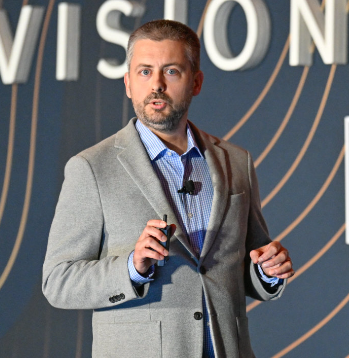Disruption as Opportunity: 10 Key Quotes from HR Visionaries
Insightful wisdom from speakers at the SHRM Executive Network’s Visionaries Summit 2024 in Austin, Texas

More than 400 of the country’s leading HR executives gathered in Austin, Texas, this fall for the SHRM Executive Network’s annual Visionaries Summit. The presentations and interactive sessions united around a main theme of how to navigate the waves of disruptions facing HR leaders today—from rapid changes in technology to the economy to workplace culture.
Here are some insightful takeaways from the summit. [Read a full analysis of lessons from Visionaries in the Fall edition of the People + Strategy journal, available online and in print Nov. 10, 2024.]
1. Don’t Shield Employees from Reality
[In response to how she reacted to a high-profile discrimination lawsuit again her company, which eventually was dismissed:] “I gave lawsuit updates monthly to employees, and we also got very transparent about our budget. We ended up showing where the cash flow was, and that gave a lot of confidence [to employees], too. No one left.”
—Elizabeth Gore, co-founder of Hello Alice
2. When It Comes to Culture, Keep It Real
“Where cultures are most impactful is where they are as transparent and genuine as they can be. … You have to build a culture where that old saying is true: ‘It’s OK to not be OK.’ ”
—Jim Link, SHRM-SCP, CHRO of SHRM
 3. Lead with Positivity During Uncivil Times
3. Lead with Positivity During Uncivil Times
“When you’re positive, people want to work with you. Particularly at a time with so much incivility, a positive attitude really stands out.”
—Jennifer Fondrevay, chief humanity officer at consulting firm Day1 Ready
4. The CEO Role: A Natural Path for CHROs
“CHROs are uniquely placed to run companies. Given our business context and our understanding of the workforce, more of us should look at [the CEO role] as a career opportunity.”
—Tamla Oates-Forney, CEO of Linkage, a SHRM Company
5. Gain Buy-In by Allowing Employees to Shape Solutions
“Behavioral change requires people coming to their own conclusion first. They come up with the policy, that’s instant buy-in. The best way to get acceptance is to involve them in the solution.”
—Jenn Graham, founder and CEO of Inclusivv
6. Upskill to Meet the Demands of an AI Future
“AI is not going to take your job, but somebody who’s willing to use an AI is. So, we have to get everybody to that point where they feel comfortable.”
—Kristen Howe, SHRM’s vice president of Enterprise Solutions Products
7. Sculpt Your Environment with Intentional Language
“The words you use create that world around you.”
—Elizabeth Norberg, chief people officer of SharkNinja, a global product design company

8. Prepare for Demographic Shifts Affecting the Labor Market
“Demographic changes—including rapidly declining fertility rates and an aging population—are reshaping the country’s age distribution in such a way that working-age adults represent an increasingly small part of the population.”
—Justin Ladner, senior labor economist at SHRM
9. Embrace Trust to Overcome Fear
“Trust is the truly courageous act of seeing possibility where others typically turn away in fear or can’t take steps forward. Those that trust can take steps forward no matter how bleak the circumstances look. … When you bring those infinite feelings, it transforms everything standing in your way. It’s how the unknown becomes breakthrough.”
—Sterling Hawkins, entrepreneur and speaker
10. End the Cycle of Incivility
“People who experience incivility in their lives are twice as likely to commit acts of incivility.”
—Susan Schmitt Winchester, author and former CHRO of Applied Materials
An organization run by AI is not a futuristic concept. Such technology is already a part of many workplaces and will continue to shape the labor market and HR. Here's how employers and employees can successfully manage generative AI and other AI-powered systems.



